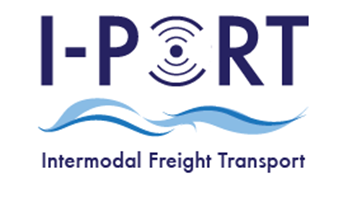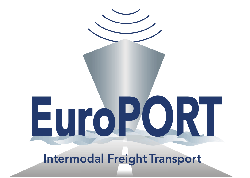Introduction
Two web pages introducing studies addressing the optimising of intermodal freight transport through European ports have recently been uploaded to iap.esa.int. Known as iPort and EuroPORT , these studies will examine the feasible and viable options of a satellite-based solution to assist users in streamlining their operations.
One of the major challenges for users is the ability to plan the arrival and departure of the different modes of transportation in such a way that containers can be transferred from ships to trucks or from ships to trains without delays.
Delays in ports can be caused by late incoming vessels, late arrivals of trucks due to congestion or port operational issues due to high winds closing crane operations due to safety considerations. The knock on effects to such delays can be considerable and impact all modes of transportation. For example, if a ship is delayed berthing then the supply chain of freight transportation coming to the port for that vessel must be re-planned for the delay.
As a result, empty vehicles often run pointless routes back to the ports when an export or empty container could have been picked up through re allocation of access slots to ports, optimisation of routes and understanding of ETAs to save these wasted journeys taking place.
The Studies
 The iPort solution consists of a cloud platform and infrastructure which will receive data from all external systems such as traffic and port systems, relevant for freight transport through ports. An API layer will provide an interface for existing systems, portable devices with the users and the web application/portal. The portable devices and web portal will both utilise satellite navigation (GPS) and satellite communications technology.
The iPort solution consists of a cloud platform and infrastructure which will receive data from all external systems such as traffic and port systems, relevant for freight transport through ports. An API layer will provide an interface for existing systems, portable devices with the users and the web application/portal. The portable devices and web portal will both utilise satellite navigation (GPS) and satellite communications technology.
 The EuroPORT study will start by identifying and engaging the user and stakeholder community at European level in order to define a set of requirements. Based on gaps and challenges of current operating solutions, needs and constraints affecting the routing and scheduling of intermodal freight transport through ports will be identified and a set of user requirements will be derived. In a state of the art analysis existing terrestrial and space based technologies, solutions and services will be identified that are able to comply with the user requirements and which will then become subject for further integration and investigation.
The EuroPORT study will start by identifying and engaging the user and stakeholder community at European level in order to define a set of requirements. Based on gaps and challenges of current operating solutions, needs and constraints affecting the routing and scheduling of intermodal freight transport through ports will be identified and a set of user requirements will be derived. In a state of the art analysis existing terrestrial and space based technologies, solutions and services will be identified that are able to comply with the user requirements and which will then become subject for further integration and investigation.
Main Benefits
The results of these studies should demonstrate the benefits of utilising existing satellite technologies in support of optimising freight transport through ports. The use of these technologies will provide better visibility of a freightâs positioning to all stakeholders during land transport whereas currently not all stakeholders are able to track the freight at every stage in the delivery journey. This clarity and precision will allow for accurate status of delivery through the duration of the process and greater security because all freight is traceable at all times.
For more information about iPort and EuroPORT, click here or see the links in the column to the right.


